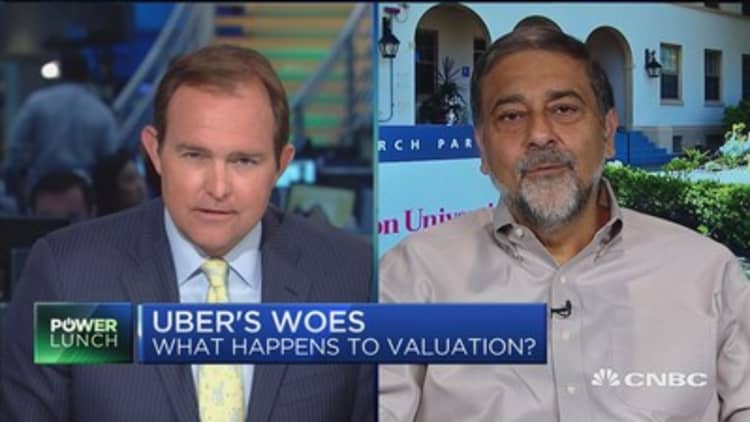As Uber's workplace scandal widens, a growing number of insiders are seeking to sell their shares. But buyers are hard to find.
"The demand side has dried up relative to the sell side," said Larry Albukerk, managing director of EB Exchange, a San Francisco broker that has arranged private sales of tech-company shares since 1999. "We're getting calls all the time from people who want to sell" at least part of their Uber stake, said Albukerk.
Uber employees have long faced tighter restrictions on share sales compared to workers at other tech start-ups. Arranging private share sales for Uber insiders has been notoriously difficult, said Albukerk, because CEO Travis Kalanick has kept a tight grip on transactions.
Another secondary market broker, who asked not to be named so as not to endanger his relationship with clients, said Uber has a "lockdown" on private sales.
Should the board decide to loosen restrictions and let employees sell some shares, the market imbalance creates another potential challenge. While Uber was valued at about $68 billion in its last financing round, investors would likely have to take a sharp discount at this point to find willing buyers.
Uber is in the throes of its biggest crisis since Kalanick co-founded the ride-hailing company in 2009. An internal probe led by former U.S. Attorney General Eric Holder that stemmed from complaints of sexual harassment has led to the departure of more than 20 employees.

On Monday, Emil Michael, Uber's No. 2 executive, told fellow employees in an email that he's leaving. Uber's board of directors is widely expected to begin a sweeping effort this week to overhaul the company's culture.
Kalanick has widespread control over the company. That includes imposing a strict right-of-first-refusal policy that allows the company to repurchase insider shares at the price set in its latest funding round rather than allowing the stock to be sold at a higher price to wealthy individuals via exchanges. Those types of rules are common at start-ups, but Uber enforces them more strictly than its peers, Albukerk said.
Secondary markets have grown much larger in recent years as more managers of hedge funds and mutual funds seek to buy shares of fast-growing startups before they go public. Insiders at Facebook, Twitter and Zynga, for example, all sold hundreds of millions of dollars worth of shares years before those company's respective IPOs.
Loosening restrictions at Uber could boost employee morale and make the company more attractive to prospective talent. Doing so now, however, could cause a rush to sell by early employees and investors, who so far have been unable to realize any gains.
An Uber representative didn't immediately respond to a request for comment.


